The Best Companion Plants for Peppers, Plus Tips to Ensure a Flourishing Crop
Growing certain plants with your peppers has benefits, from pest and disease control to soil improvement.
What vegetable garden would be complete without a thriving pepper crop? Growing your own peppers, like crowd-favorite bell peppers or turning up the heat with a spicy pepper variety, is easy to do in containers, raised beds, or directly in a garden bed. To ensure your peppers grow well, consider planting companion plants. Companion planting is the act of growing plants together that are mutually beneficial to each other, whether for pest and disease protection, soil enrichment, or ground and shade cover. Several companion plants, from flowers to herbs to fellow vegetables, will help your peppers succeed this season. Ahead, we spoke with experts to learn which plants to grow with peppers, helpful tips, as well as which plants you should avoid.
Meet Our Expert
Mary Jane Duford, certified master gardener and permaculture garden designer
Tony O'Neill, gardening expert and author of Composting Masterclass, Your First Vegetable Garden, and Simplify Vegetable Gardening
Related: Use Our Companion Planting Chart to Grow a Thriving Vegetable Garden
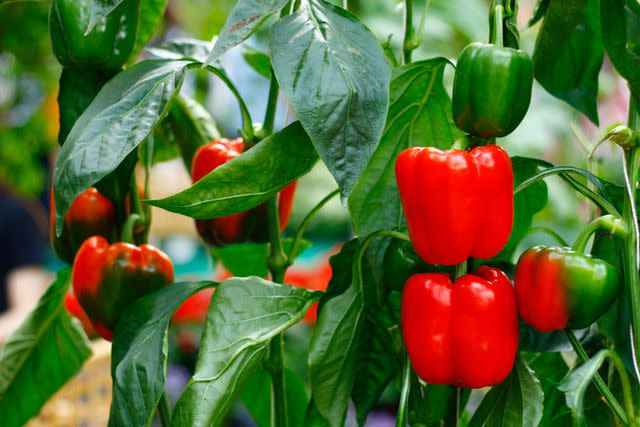
Vasin Hirunwiwatwong / Getty
Why You Should Companion Plant for Peppers
Like any other garden vegetable, peppers are susceptible to several pests and diseases, like aphids, cutworms, pepper weevils, blight, and powdery mildew. Luckily, companion planting with friendly plants can help repel these pests and deter diseases that might harm your pepper crop. "Certain companion plants can repel pests naturally, reducing the need for chemical pesticides," says Tony O'Neill, gardening expert and author. "Some companions, like beans and other legumes, fix nitrogen in the soil, enriching it for nitrogen-hungry plants like peppers. This natural fertilization supports healthy growth."
Companion planting can also attract friendly pollinators, like bees. "Flowers like lavender and borage draw bees, which in turn help pollinate pepper flowers, increasing the yield," says O'Neill.
Best Companion Plants for Peppers
When choosing your companions for your pepper crop, consider these plant varieties.
Tube-Shaped Flowers
Tube-shaped flowers like snapdragon, baptisia, and bee balm attract helpful pollinators like bees, says Mary Jane Duford, certified master gardener. "Attracting bumblebees to the area is helpful for pepper plant pollination because the large bees can also land on pepper flowers and jostle them to release pollen," she says.
Related: How to Create a Thriving Pollinator Garden
Marigolds
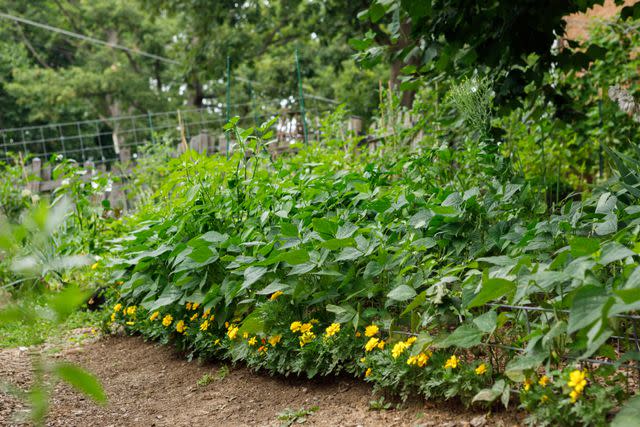
eurobanks / getty
These bright flowers actually suppress nematodes from the soil, says Duford. Marigold roots release a compound called alpha-terthienyl which is toxic to nematodes, particularly root-knot nematodes. "Planting marigolds as a cover crop at least two months before the main crop can significantly reduce nematode populations in the soil," says Duford. "Marigolds can also attract beneficial insects like ladybugs and lacewings."
Alliums
Planting common alliums like garlic, onions, scallions, or chives have several benefits. First, each of these plants helps repel pests like aphids. Chives, in particular, repel aphids and help to enhance the flavor of pepper plants.
Cowpeas
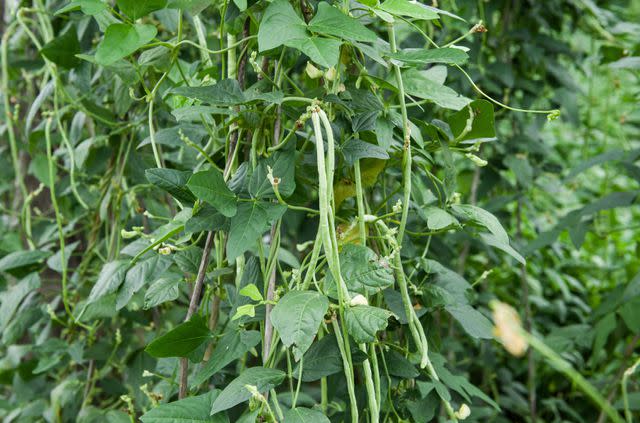
zhikun sun / getty
Cowpeas are legumes that grow in pods off climbing or trailing vines. Planting cowpeas with your peppers is highly beneficial. "Cowpeas capture nitrogen that the pepper crops can use," says Duford. "They also keep weeds down by inhibiting seed germination and competing for light, acting as a living mulch."
Related: 21 Plants That Improve Soil Quality, Making Your Whole Garden Thrive
White Clover
You might think of white clover as a weed, but who says weeds aren't a good thing? Consider putting white clover next to your pepper plants. "White clover adds nitrogen and improves soil structure," Duford says. "Opt for shorter 'Dutch White' or 'New Zealand White' to avoid competition for light."
Carrots
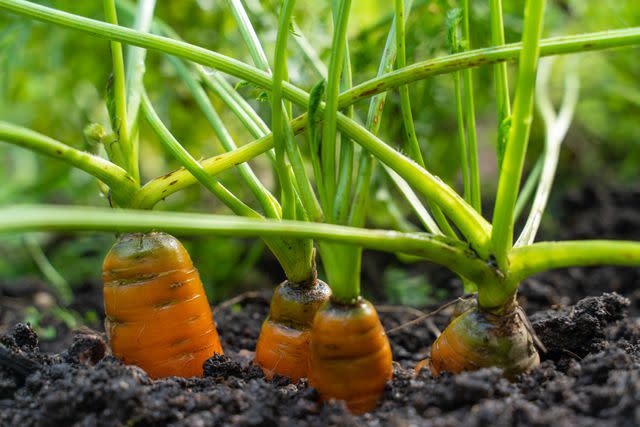
Tatiana Maramygina / Getty
Carrots, with their deep roots, can help break up and loosen soil for neighboring pepper plants. Carrots can also attract beneficial insects like ladybugs and lacewings.
Related: 10 Easy Vegetables You Don't Need a Green Thumb to Grow
Spinach
Planting spinach is great for keeping soil moist and shaded. "Spinach grows low and provides ground cover, retaining moisture and keeping the soil cool for moisture retention," says Duford.
Oregano
Oregano, like spinach, grows low to the ground, providing cover for the soil. Beyond providing ground cover, its herbal scent repels pests while also attracting good, beneficial insects.
Related: 7 of the Fastest-Growing Plants for Your Garden
Tips for Companion Planting for Peppers
As you plan your garden, be mindful of these tips that will help both your peppers and their companions thrive.
Timing
You can generally plant your companions at the same time as your peppers, but for some, like marigolds, you might want to consider planting them earlier to help with pest control.
Spacing
Be careful not to overcrowd your plants. "Ensure there’s enough space between your peppers and companion plants to avoid overcrowding," O'Neill says. "This helps in proper air circulation and reduces the risk of disease. Follow the spacing guidelines for each plant species, typically allowing 12 to 18 inches between pepper plants."
Height
You'll want to be mindful of the height of your mature companion plants, says O'Neill. If they grow too high, they may overshadow your peppers, depriving them of crucial sunlight.
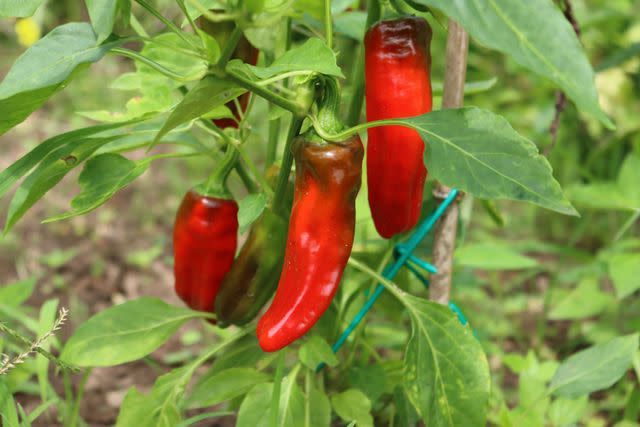
saraTM / getty
Related: How to Grow Lettuce for Crisp, Fresh Salads All Season Long
Plants to Avoid Growing With Peppers
Just like there are friendlies that play well with peppers, there are also plants that can inhibit your pepper garden's growth. Avoid these plants when thinking about companion planting for your peppers.
Brassicas
Vegetables that belong to the brassica family include kale, cabbage, and broccoli—and they shouldn't be planted near your peppers. "Brassicas release glucosinolates, which transform into compounds that inhibit the growth of certain plants, including potentially stunting pepper plants when grown in close proximity," Duford says. Brassicas can also compete for the same nutrients as peppers, says O'Neill.
Fennel
Like brassicas, fennel can inhibit pepper growth. "[The] allelochemicals it produces, particularly phenolic compounds, may interfere with metabolic processes critical for plant growth," Duford says.
Potatoes and Tomatoes
Peppers, potatoes, and tomatoes are all part of the nightshade family. You'll want to avoid planting these family members close to each other because "they share common pests and diseases, increasing the risk of infestation and spread," says O'Neill.
Read the original article on Martha Stewart.

